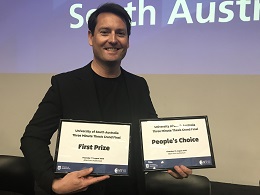24 August 2018
 Know that hazy feeling you get after drinking a few glasses of white wine? Well, the environment is feeling it too – to the tune of 250,000 tonnes of carbon dioxide each year.
Know that hazy feeling you get after drinking a few glasses of white wine? Well, the environment is feeling it too – to the tune of 250,000 tonnes of carbon dioxide each year.
That’s the annual amount of CO2 being released into the atmosphere due to inefficient production processes involved in making white wine, according to UniSA doctoral candidate Brian Murphy.
Murphy, who won the 2018 UniSA 3MT grand final on 23 August, says the haze-forming proteins in white wine are well known, but the removal processes are still stuck in centuries-old traditions.
“A simple glass of white wine has a production inefficiency equivalent to New Zealand’s entire annual white wine production,” says Murphy, a PhD student in UniSA’s School of Engineering.
“In the white wine-making process, certain proteins are exposed to heat, causing an otherwise clear white wine to go hazy. If this occurs after the bottling process it becomes a major concern for producers who stand to lose millions of dollars in lost sales.”
Murphy is experimenting with new nano-engineered materials to remove those haze-forming proteins, so consumers can enjoy a crystal-clear glass of white wine, safe in the knowledge they are helping the environment as well.
“Essentially, I’m creating surface active agents – molecules called micelles – and integrating them with a simple particle of sand to remove the proteins at the nano level. By re-engineering the surface of these particles, we can improve the production process, removing any risk of haziness.”
He says early results are promising, showing not only that proteins can be removed using this process but – more importantly – the quality and taste of the wine is not adversely impacted.
“It’s a win-win situation all round,” he says. “Production processes are improved, saving time, money and the environment, and consumers can be guaranteed of crystal clear white wine.”
Murphy was one of eight finalists who pitched their research in three minutes to a packed audience at UniSA’s City West campus on 23 August. The event was co-hosted by The Bob Hawke Prime Ministerial Centre.
He won not only the judges’ vote, collecting $3000, but also the $1000 People’s Choice Award, rewarding him with a $4000 research travel grant in total and a place in the Asia-Pacific 3MT national finals to be held on 27 September.
The second placegetter was Tahnee Dening, who is researching a potential solution to tackle obesity using clay, which absorbs fats. Equal third place went to Jeff Ansah (using social media to predict protest events) and Joe O’Leary (accurate tracking of GPS satellites).
Dean of Graduate Studies, Professor Pat Buckley, said the audience were very appreciative. "Important research, told compellingly by smart researchers, is a winning formula," she said.
Media contact: Candy Gibson mobile 0434 605 142 email mailto:candy.gibson@unisa.edu.au




